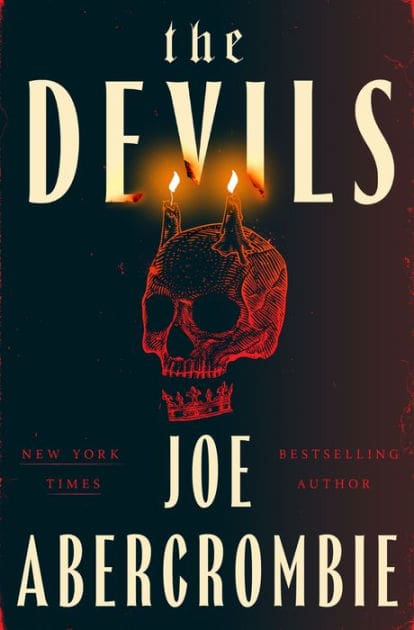
Synopsis:
Holy work sometimes requires unholy deeds.
Brother Diaz has been summoned to the Sacred City, where he is certain a commendation and grand holy assignment awaits him. But his new flock is made up of unrepentant murderers, practitioners of ghastly magic, and outright monsters. The mission he is tasked with will require bloody measures from them all in order to achieve its righteous ends.
Elves lurk at our borders and hunger for our flesh, while greedy princes care for nothing but their own ambitions and comfort. With a hellish journey before him, it’s a good thing Brother Diaz has the devils on his side.
Review:
All told, I’ve probably read some five thousand pages of Joe Abercrombie books. From his First Law series to his YA stuff, I’ve eaten it up, all of it. Abercrombie brings a no nonsense brand of worldbuilding (of the familiar Tolkien/G.R.R. Martin lineage) with a cast of colorful and compelling characters. Like Martin, even (or especially) his villains are compelling and human and, yes, sometimes likeable. And under all of the backstabbing and political intrigue and wars in the North, there lies a continual theme of redemption. So many characters on the last legs of a lifetime of bad behavior, searching for some kind of meaning, searching for something worth dying for.
Which is why I’ve never quite understood the “Grimdark” designation as applied to Abercrombie. The grimmest parts of his books are where they most closely parallel our own world, where the rich and powerful manipulate world events to enrich themselves and screw over everyone else. That’s not Grimdark. That’s just current events.
The Devils finds Abercrombie even farther from any supposed Grimdark designation, with a fantasy adventure that is almost, well, a comedy?
The Devils takes place in an alternative middle ages, where the Church is still the center of the world, but the world (and the church) are a bit aslant. The savior is a woman, and so is the Pope, but none of that makes much difference, because a matriarchal theocratic empire isn’t much different from a patriarchal one after all.
Brother Diaz, a less than reluctant hero, is called to a meeting with the Pope, expecting some change of station, and gets more than he bargains for. He is now head of the Chapel of Holy Expediency, which is a bit of wordplay that walks the line between Orwell and Dr. Strangelove. This is the church’s “nuclear option”: a band of devils containing a werewolf, a vampire, a necromancer, a cursed knight, and an Elf. Their mission is to install the rightful empress of Troy on her throne.
The setup is, despite all of the weirdness, rather familiar, with a kind of Suicide Squad/Seven Samarai vibe in which our band of miscreants slash their way through much of Europe while discovering their respective hearts of gold.
Similarly, the narrative structure is quite familiar, and also quite different from Abercrombie’s usual, tightly-plotted nesting dolls of books. The Devils instead takes its shape more from a video game or, perhaps, a role playing game, with the party set out on their quest, meeting one challenge after another in episodic fashion, heading to the inevitable Final Boss.
Neither of these observations are criticisms, though. The Devils works quite well with its stripped down plot, because it’s really just a carrier for a wonderful cast of characters. Through episodes of adventure, violence, romance, and comedy, we come to know this band of misfits and to love them.
Abercrombie has a soft spot for the outcast and the seemingly irredeemable that runs through all of his work, but here it’s given a treatment that nears sentimentality, and it works. From Alex, who goes from guttersnipe to reluctant empress, to Sunny, an elf dealing with a racial hatred for Elfkind who most often chooses invisibility, to Vigga, a werewolf whose violent appetites have defined her even before the advent of her supernatural curse, we are treated to well-rounded, vulnerable characters, all craving connection.
The Devils doesn’t feel quite as propulsive as The First Law series, but in some ways it feels more honest, and finally more satisfying. It’s a big, sprawling DnD campaign that both promises more and also feels whole and complete, whereas so much else of Abercrombie’s work feels like a snapshot of a much larger and more complicated story. This simpler, more streamlined take on the fantasy novel, as well as the author’s risking of sentimentality, pays off in the end.








Leave a Reply